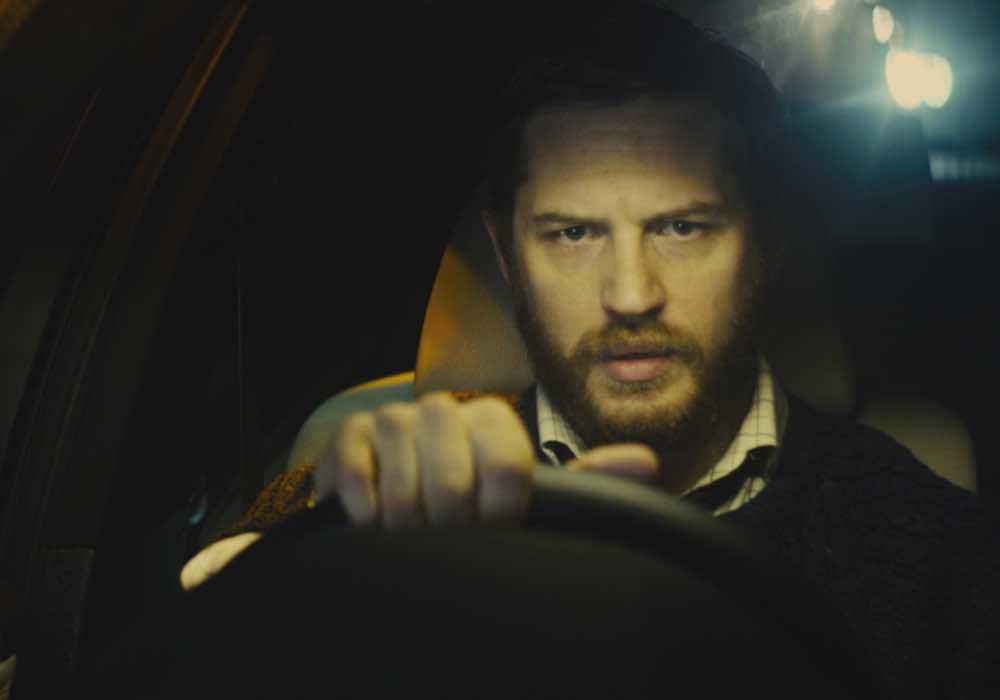
When Ivan Locke (Tom Hardy) gets into his BMW and drives away, at the beginning of Locke, he puts his personal and professional lives into crisis. His destination is a hospital in London, about ninety minutes from his construction site, for a personal errand. Going there means taking the road less travelled, a righteous path, which could cost him everything. He’ll be in London overnight, so he won’t be in Birmingham the next morning to oversee a massive concrete shipment he’s responsible for. The timing couldn’t be worse since the shipment is unprecedented in its size and importance. Writer-director Steven Knight’s intense psychological thriller, Locke, follows Locke in real-time on this ordinary yet perilous journey. It takes place entirely inside Locke’s car, never leaving his side, although it’s full of intrusions from the stressful outside world: Locke spends most of the film making phone calls, forcing himself to remain almost pathologically calm.
Knight conceived of and shot this eighty-minute film as theatre: each night of the shoot, they ran through and filmed the entire piece in sequence, twice, just like a play. The result is undeniably cinematic. Driving on the M6 at night, Locke is constantly surrounded by blurred lights in red, blue, and white specks, both beautiful and metaphorical: right now his whole world is inside this car and the tears he keeps welling up make the outside world blurry. It’s a visually rich world, as the camera changes angles frequently.
The journey itself is also an obvious metaphor – a journey away from Locke’s old, comfortable life, to something unknown, possibly a new life or just a detour. Watching the car in motion, as the background changes, the weight of the journey sinks in: he gets closer and closer to his destination, and further and further from the familiar. Knight never shoots from Locke’s point of view: we may know what the destination is intellectually, but we never see what it looks like, only the road signs along the way.
In order to maintain his conceit, Knight had to create a character who could get himself into this situation at all. Locke needed to be someone with serious emotional issues so that he would believably be trying to have deep, potentially life-changing, emotional conversations by phone. Like the stolid concrete man he is at work, he tries to skip the heart-to-heart and jump straight to practicalities, which seems more alarming than comforting. He’s in a messy situation, and there are no easy fixes: the more he pushes, the less likely he is to get a result he can be happy about.
There isn’t enough backstory to motivate just what is wrong with Locke, including why he’s talking to his invisible dead father in the back seat. Has he lost his mind? Or is this just a shoddy device to give us just enough backstory to understand the basic decision he’s made without explaining why he’s going about it in this particular way? Locke’s heightened masculinity only makes him even more difficult to read.
The film adeptly raises many questions, smartly refuses to give easy answers, but leaves too many things open-ended. What made Locke so closed off? What made him so prone to make a mistake that could cost him everything, and to own up to it in the way he chooses to? And why is Locke so intent on fixing things that seem beyond repair? Why didn’t he start this process earlier, before it could be too late?
The film is quite the work-out for the very talented Hardy who is held almost entirely in close-up, yet must convey a world of emotion, using only his stationary body from the waist up. Hardy still gives an undeniably physical performance, as his hands shake, his eyes water, and he deftly steers the car, pushing forward, eyes on the road, blowing up his life in the process. There’s also some tremendous voice work here both from Hardy and the rest of the cast: we may never see his wife or his children, but we instantly understand their bond from their tone and what isn’t said. He uses his work calls as an outlet to channel his personal frustration, exasperatingly instructing his underling on how to manage the upcoming build. And everything registers its effect on Hardy’s physique.
The film, through Hardy’s layered performance and his nuanced interactions with others, promises complexity, but the script proves too insubstantial to deliver it. It’s a compelling eighty minutes – these actors can make discussing the make-up of concrete riveting – that smartly leaves things unresolved. But just like everyone else in Locke’s life, we’re left wanting desperately to get inside his head, the inner-workings of which remain a mystery.
Read more: Review: Riz Ahmed stars in City of Tiny Lights >>

